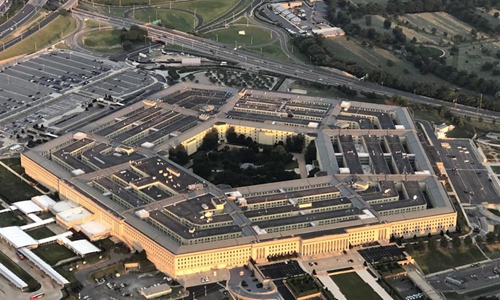Esper escalates military tensions against China with war of words
Source: Global Times Published: 2020/7/20 19:58:53

The Pentagon is seen from an airplane over Washington D.C., the United States, on July 11, 2018. Photo:Xinhua
US Defense Secretary Mark Esper said on Saturday that the US' "top strategic competitors are China, then Russia." He added that China is the bigger problem, and that it wants to rewrite the rules of the international order that have served the world so well since the end of WWII.The words of Esper, as US Defense Secretary, convey different meanings than those of US Secretary of State Mike Pompeo, who had previously made similar statements. To a great extent, Pompeo was bluffing. But Esper tagged China as a "top strategic competitor" from a military perspective, based on current China-US military disputes. This shows that the US is going to take China more seriously in military terms, and even imagine China as a target for war.
Esper also said that the Chinese military is loyal to the Communist Party of China, while the US military "has a sworn oath to defend the Constitution." He said, "We have very different ambitions… and very different value sets," according to an interview published on the website of the US Department of Defense.
With this comment, Esper was completely trying to make a fool out of other people. According to a report published by China's National Institute for South China Sea Studies in June, the US has deployed some 375,000 soldiers and 60 percent of its warships to the Indo-Pacific region. The USS Theodore Roosevelt was seriously affected by the COVID-19 pandemic, but the US sent the aircraft carrier anyway to patrol in the Western Pacific in June again. This is not to "defend the Constitution" at all, let alone to "safeguard" peace and freedom. The US is simply provoking other countries and trying to contain China.
A CNBC report published on Saturday said that the cold war between China and the US "just got a lot hotter." However, it is unlikely that a comprehensive hot war will break out between the two countries at present. The US is trying to put on an aggressive posture. But being hit hard by the COVID-19, the US is now very weak. The US' recent moves in the South China Sea are also bluffs that are trying to further provoke and deter China. Indeed, China will not take an initiative to provoke the US. But China will not retreat as well if the US wants to harm China's national interests.
Nonetheless, there could be small hot wars in some areas — or what might be seen as accidental crossfires. The most possible battlefields are the South China Sea and the Taiwan Straits.
The South China Sea is a core area of the US Indo-Pacific Strategy. Washington wishes to put the area under its control to maintain or even increase its dominance in the region.
Some individuals on the island of Taiwan, such as Tsai Ing-wen, hope that the US will further interfere in the cross-Straits affairs — so that they can take advantage of the US military to realize their secessionist goal.
China is completely capable of handling such accidental crossfires. The US leads the world in terms of military power. But this is based on its total number of military. Due to its global deployment, the US has deployed only a handful of aircraft carriers and assault ships at each base. In the meantime, China has constantly enhanced its military strength in recent years. It has developed anti-ship missiles and anti-ship ballistic missiles.
We don't need to compare the exact number of carriers the US and China have now. Instead, we are talking about asymmetric warfare in which we can use a wide range of anti-aircraft carrier weapons. These include DF-21D and DF-26, both of which are regarded as "aircraft carrier killer" missiles.
From this perspective, in the Western Pacific region, China is militarily capable of contending with the US. China is not afraid of the above-mentioned accidental crossfires.
China certainly won't mess around in the first place. But if the US reaches out to provoke, China won't sit back and take it.
The article was compiled by Global Times reporter Li Qingqing based on an interview with Li Jie, a Beijing-based naval expert. liqingqing@globaltimes.com.cn
Posted in: VIEWPOINT